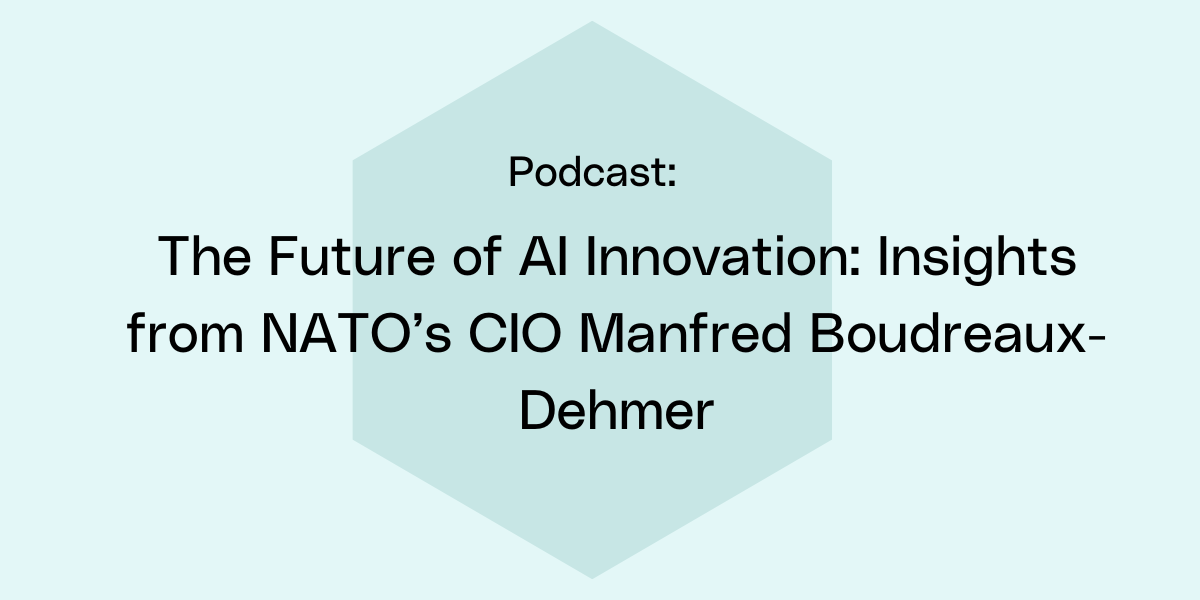AI is a very polarising topic; that’s one thing we can all agree on. But when it comes to AI innovation, there’s no denying its impact. It’s transforming every field and industry it touches, and that includes even the largest and most powerful military alliance in the world: NATO.
We recently had the pleasure of having NATO’s first-ever Chief Information Officer (CIO), Manfred Boudreaux-Dehmer, on the Data & AI Mastery podcast.
During an exciting conversation with Raoul, they discussed the future of AI, the vast opportunities it brings, and the unavoidable challenges it presents. The discussion was packed with valuable insights, and we’ve gathered them here for you to explore.
The Expanding Potential of AI
Manfred made an interesting comparison, likening the rise of AI to the internet revolution. He said, “It's kind of comparable with the internet, when that came in and suddenly if you wanted to know something you could, instead of finding the almanac on your bookshelf or somehow going to a library and reading up on it, the fact that you have instant access to all the information that's out there is revolutionary.”
And if the internet marked a significant leap forward, what can we then say about AI?
With AI, everything is expanding at an unprecedented pace.
As Manfred puts it, “Now, we can take things that we had to still look up online, but in a cumbersome fashion. AI is putting that on steroids, and it's taking it to the next level. And so I'm very excited about it.”
One thing we can all agree on is that AI’s impact is profound, allowing businesses, governments, and organisations to do things that were once unimaginable.
Balancing AI Innovation With Responsibility
But with great power comes great responsibility. As Manfred points out, as we push AI to new heights, we need to be mindful of the ethical and security challenges that accompany such transformative technology.
He shares his concerns for the future: “AI can be used for good and for bad. So, we should do what we can to support the good use of AI. And that is very exciting. Now, what I am concerned about is that we don't do that all the time, particularly for AI and for the responsible use of data. I am concerned about bias that can sneak into your data.”
Ultimately, using AI responsibly demands an intentional approach. That requires ongoing vigilance, transparency, and collaboration across all sectors.
Practical Approaches At NATO
Implementing AI takes some planning. NATO’s approach to it is a prime example of how thoughtful execution can make a real-world impact while minimising risks.
Here are the key use cases of AI that NATO has focused on:
- Routine Jobs and Automation: They have identified routine tasks that can be automated, freeing up personnel to focus on more strategic and complex work;
- Translation: With NATO’s multilingual environment, automating translation processes for official documents and communications helps ensure efficiency and accuracy;
- Hackathons to Drive Innovation: NATO uses hackathons to engage a wide range of employees in AI development and encourage creative solutions;
- Data-Driven Decisions: Data is essential to their AI approach, ensuring the right information is available to make informed decisions;
He concludes, “There's always a guardrail around in whatever we do on making sure that this is used for the purpose that is an intentional, benevolent purpose really for AI based on the guidelines that we give to the team. In summary, it was a very practical way that we took what could make the biggest impact right now and where do we have data to support that impact.”
The key takeaway from NATO’s approach?
Identify the AI use cases that will create the most significant impact for your organisation.
The Future of AI: Innovation With a Conscience
AI is an exciting field full of opportunities. And we’re only scratching the surface!
Manfred says, “What excites me is that it's a never-ending field of expansion. [...] Again, I think the internet was a game changer. I think AI is a second big step, exponential step in being a game changer.”
The bottom line is that organisations and individuals alike need to approach AI with care and purpose. Yes, it holds endless potential for innovation, but we must use it responsibly.
With the proper knowledge and skills, we can harness AI’s power to drive meaningful progress while maintaining ethical standards.
If you’re looking to upskill your workforce and equip them with the crucial skills needed to lead transformative change, Cambridge Spark is here to support you every step of the way. Explore our expert programmes designed to help you make an impact where it matters most.
